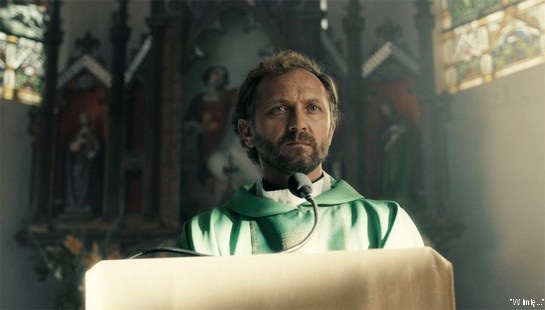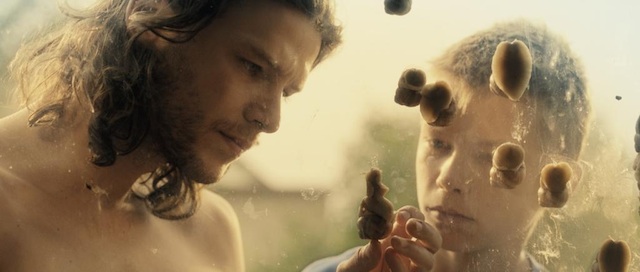After a couple of decades, Polish cinema is still Wajda, Kieslowski, Skolimowski; its past glory overshadows its present. But Małgośka Szumowska is one of few contemporary Polish directors recognized outside of the country (she co-produced Lars von Trier’s Antichrist). The media claim she’s a provocateur, a label she consistently refuses. Some like her not shying away from touchy subjects, others see her reluctance to be simply ordinary as flawed an pretentious. One sure thing is her films are always uncompromising, bold and never leave the audience indifferent. They also have a unique visual quality, which is Szumowska’s trademark co-established by her cinematographer Michał Englert, who recently won the cinematography award at Sundance for Jacek Borcuch’s Lasting.
In the name of…, Szumowska’s latest film, is a story of a romantic relationship between a priest struggling with his homosexuality (Andrzej Chyra) and a young man from his tiny parish (Mateusz Kościukiewicz). It has just been given a Teddy Award during the 63. Berlinale, making Szumowska the first ever Polish director, and one of few Eastern European filmmakers, to receive this prestigious and meaningful prize.
Keyframe: Kim Nguyen, the director of the Oscar-nominated War Witch, got inspired by a story he read in a newspaper. I hear that the story of your film is similar…
Malgoska Szumowska: The idea for this film was conceived a long time ago–four years, I believe. In the mean-time I made Elles, but I have started thinking of this project way earlier. I remember reading an article in some magazine, it was about a young man who killed a priest, and nobody knew why. There were of course suspicions of a love affair or a homosexual underpinning of that tragedy. Then the media dropped it. I found it very interesting, yet I was not interested in recreating the story itself. Instead it inspired me to create a narrative about a romantic relationship between a priest and a young man. Polish press claimed that I made a film about priest’s affection for a teenager. I want to make it clear: these claims are completely false. I intentionally changed the age of the protagonist played by Mateusz Kosciukiewicz, I wanted him to be a man, not a boy, because In the name of… is a film about love between two grown men, out of which one happens to be younger and one older, that’s all.
In the Name of… Trailer
Keyframe: Looking at your film credits it seems like you always work with the same people…
Szumowska: My recipe for cinema is always working with friends, people who I know well. The producer the cinematographer, the actors… the same thing goes for my editor, Jacek Drosio, who’s responsible for all my films to date. Without him this film would have looked completely different. We have great chemistry, don’t need words. He calls himself an expert in helpless cases: if in the finished material the dramaturgy is off, he can fix it. I took him a year to complete the editing process in this case, sometimes without my participation at all. He’d invite me maybe once a month to come and see the progress. And he succeeded. I find it truly amazing to work with such trusted crew. Jacek’s editing was vital for this film.
Keyframe: Was trust also crucial in working with Andrzej Chyra, who plays the main character, priest Adam?
Szumowska: The same thing refers to Andrzej. We’ve know each other for years, he had two smaller parts in my previous films, I also watched his theatrical accomplishments [Chyra has been a steady collaborator of well-known Polish theater director Krzysztof Warlikowski] and thought nobody has properly taken advantage of his talent before. He has not been given a part that would stand up to his acting capacity since 1998. So I knew I wanted to write this script for him, and so I did. I also wrote it for Mateusz Kościukiewicz; they were the duo I had in my mind from the very beginning. Our work was based on mutual trust, we didn’t need to blabber too much, we both wanted it to turn out well. I didn’t have to fight him. I really like it when actors trust me. It’s the best feeling.
Keyframe: Can you tell me a bit more about the village you shot in? There is something sensual and haunting about this landscape…
Szumowska: It’s not really a village but a whole area in the region of Masuria [a region in north-eastern Poland, famous for its plentiful and beautiful lakes] that I’ve been visiting since I was little. One could say I grew up there, in a certain sense—I’d spent all my summer holidays there, it’s my place on earth. This is where me and Michał Englert shot Cisza [Silence], which took us on a whole new level as artists. This tiny production got over 25 awards all around the world and gave us international recognition. This is also where I shot A czego tu się bać” [There’s Nothing to be Afraid Of]—a documentary about burial traditions. It felt like this was the time to shoot a feature there. I somehow wanted to immortalize this incredible place, so close to the nature, wild and brutal. Placing my history there was a great choice, because it gives the story this sort of claustrophobic frame. I think I needed that: such story would never happen in the city, or rather, if it did, it would happen differently. It had to be this place, soaked with erotic tension. There is a symmetry between its nature and the blossoming sexuality of my two characters.
Keyframe: You’ve decided to cast many non-actors in supporting roles. Why?
Szumowska: The local boys we see in the film are so authentic, spontaneous, fresh. They take away the risk of pretentiousness, if there was any, and give this film a semi-documentary character, enhance the realness of it. I rarely watch my films, and here, in Berlin, it was the first time I have ever watched a film of mine at a proper screening with the audience. I liked both the silence and the reactions, it felt really good, but I also had an impression that to this audience the reality of it seems exotic, because of the camerawork, this documentary feel and those non-actors… Also, Michał Englert insisted, and in the end we were the only crew who had their film screened from a 35mm print, even though it was shot digitally. I think it added to this impression, and gave the picture a very different character.
Keyframe: How does the fact that your film is screened in the Berlinale’s main competition make you feel?
Szumowska: It’s been a while since there was a Polish film, not to mention made by someone from my generation, in the Berlinale, or any other significant Festival competition section. I gives me a huge boost of positive energy. I want to keep on working. I feel like I see the purpose of it now that I get a good reaction. It’s great. Let’s be honest: there are not that many films in the main competition, right? I am also very tired with all these emotions and interviews. It’s quite draining.
Keyframe: There was a bit of a fuss in Poland when In the name of… got chosen for the Competition section in Berlin. Why do you think that happened?
Szumowska: People have this need to label things, associate directors with certain filmmaking styles, no doubt about that. I feel there was a certain amount of uneasiness and lack of trust. People would ask why has this film been chosen for the Festival, why is it here. Who knows, maybe such reaction is normal? It’s certainly expected. I made a film about a priest who has a certain problem and everybody immediately asks: ‘Why?’ Well there’s not much I can do about the fact that apparently the film world finds such subject more interesting than something else.
Keyframe: Why has it found your film interesting then?
Szumowska: We keep on talking why are there so few Polish films in foreign festival’s selection. Well, so there is one finally, here it is. Obviously, the foreign journalists that interview me are usually doing that because they like it. But what they claim is that the key to this story is its universality. Sure, it is set in Poland, in Polish reality and touches upon one of our issues—for example the French do not have to deal with such a problem [a struggle with homosexuality]—but it speaks a language people understand and feel. I believe these two qualities, specificity and universality, have to meet so the film can be well received by an international audience. Can you believe that the first country we sold the film to was Turkey? Also Belgium bought it and it keeps on selling.
Keyframe: Poland’s reality has changed over the last couple of years and now, for example, with the fight for civil partnership for same-sex couples bursting in the background, your film has gained a context and topicality it couldn’t have four years ago. Is it good or bad?
Szumowska: I definitely don’t think it’s bad that the subject we are talking about is becoming very current. I didn’t plan it! What is important to me, and what I keep on repeating when discussing this film is that I don’t want to take sides or participate in any kind of political discussion. It’s not why I made this film and I can only hope it has its own voice to speak for itself. I’d like it to trigger a dialogue, not a yelling contest or a wave of hate speech but a calm, reasonable discussion. Unfortunately I cannot tell what’s going to happen in the future.
This interview is being cross-published with Stopklatka.pl.





